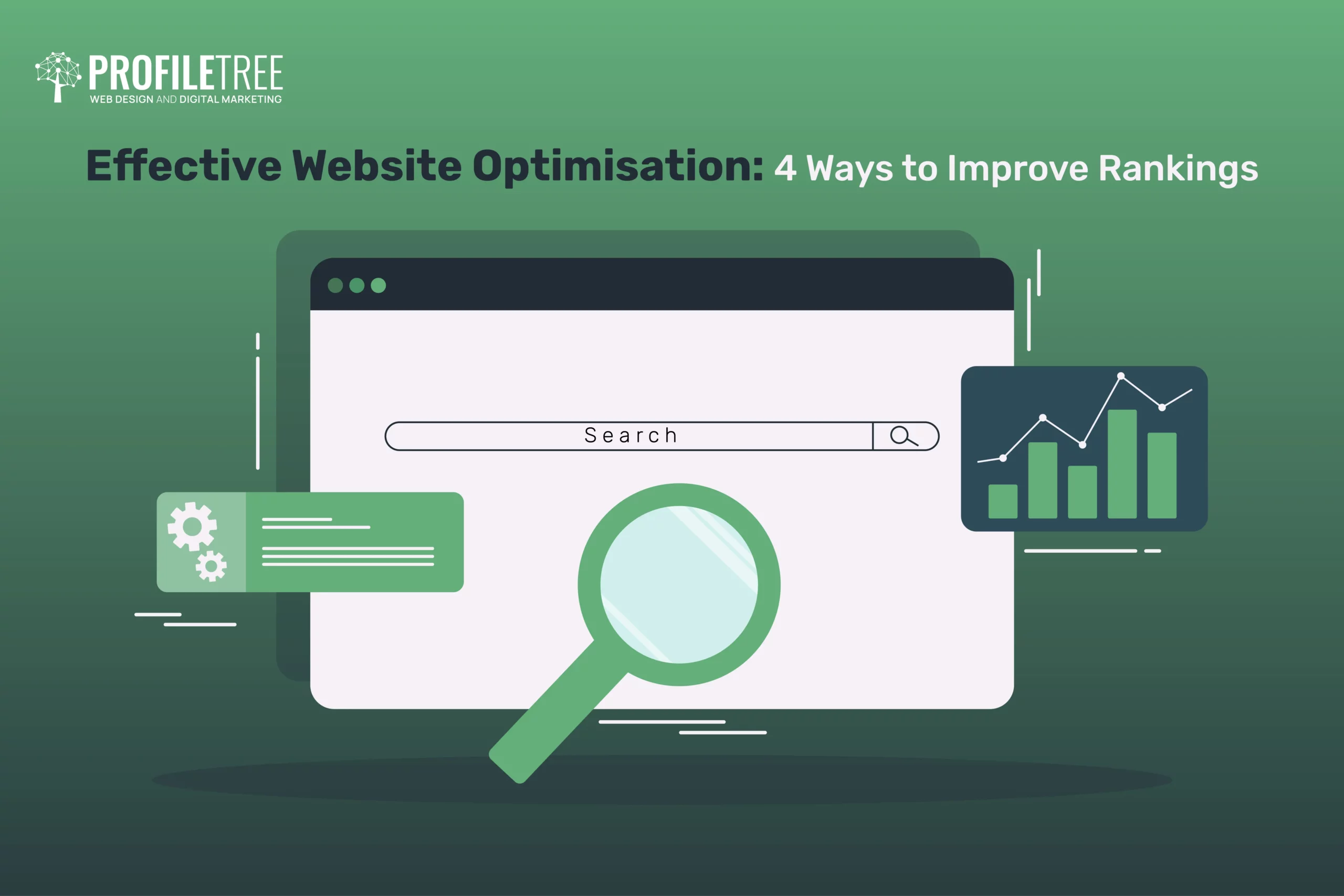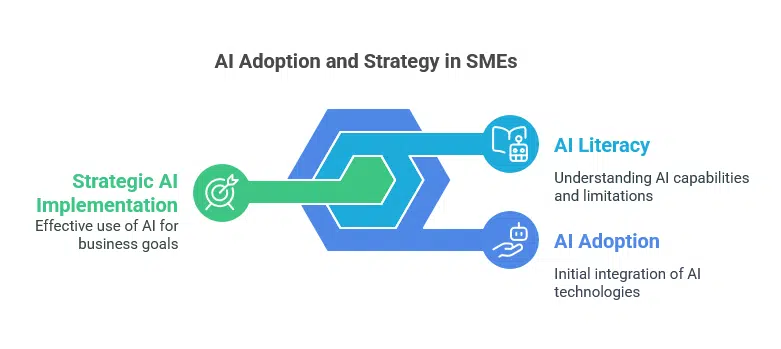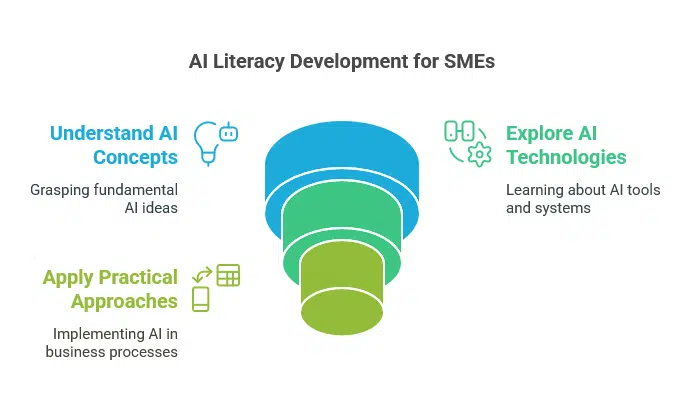
Future-Proofing SMEs: Building AI Literacy and Strategy for Long-Term Success
Table of Contents
The artificial intelligence revolution has firmly taken hold across the business landscape, yet a significant gap exists between AI’s potential and many SMEs’ readiness to harness it effectively. Research reveals that only 10% of Irish SMEs have developed a formal AI strategy, despite 91% of Irish organisations using AI. This disconnect highlights a critical challenge: while AI tools are increasingly accessible, the knowledge needed to implement them strategically remains underdeveloped among small and medium enterprises.
The primary barrier isn’t technological but educational—62% of Irish SMEs cite lack of expertise as their main obstacle to effective AI adoption. This skills gap represents both a vulnerability and an opportunity. Businesses that develop robust AI literacy among leadership and staff gain significant competitive advantages. At the same time, those who neglect this increasingly essential knowledge risk falling behind as AI-enhanced competitors achieve greater efficiency, innovation, and market responsiveness.
For today’s SME leaders across Ireland and Northern Ireland, AI literacy has evolved from a specialist technical skill to a fundamental business capability on par with financial acumen or marketing knowledge. Understanding AI’s potential applications, limitations, ethical considerations, and implementation approaches has become essential for informed decision-making in an increasingly AI-influenced business environment.
This comprehensive guide explores how SMEs can develop the AI literacy and strategic frameworks needed for sustainable success. It covers everything from foundational knowledge building to strategic implementation planning and governance considerations.
The Current State of AI Literacy Among SMEs

As artificial intelligence (AI) becomes an integral part of the business landscape, the gap between its widespread usage and the strategic understanding required for effective implementation remains significant among SMEs. While 91% of Irish organisations have adopted AI in some form, only a fraction of SMEs have developed a clear strategy to leverage its full potential. This section explores the current state of AI literacy among SMEs, highlighting adoption patterns, capability gaps, and common knowledge deficiencies that hinder effective AI deployment.
Adoption Patterns and Capability Gaps
Recent research reveals several significant trends in AI adoption and literacy among Irish SMEs:
- 91% of Irish organisations now use AI in some form, but adoption is frequently ad hoc or occurs as “shadow AI”—tools used by employees without formal policy or strategic direction
- 64% of SMEs report insufficient internal AI capabilities to implement and manage solutions effectively
- Only 28% of small business leaders report confidence in evaluating AI vendors and solutions
- 72% of SME decision-makers express concern about falling behind competitors in AI adoption
- 83% recognise AI literacy as increasingly important but struggle with where to begin
These statistics highlight a familiar pattern: while AI tools are increasingly accessible and widely used, the strategic knowledge needed to implement them effectively for maximum business impact remains underdeveloped.
Common Knowledge Gaps and Misconceptions
Several specific knowledge deficits frequently limit effective AI implementation:
Technical Understanding Limitations
- Confusion about different AI approaches and their appropriate applications
- Unrealistic expectations about AI capabilities based on media portrayals
- Uncertainty about data requirements for effective implementation
- Limited understanding of integration challenges with existing systems
- Misconceptions about implementation timelines and resource requirements
Strategic Application Gaps
- Difficulty identifying high-value AI use cases within the business
- Challenges translating technical capabilities into business outcomes
- Limited ability to evaluate ROI potential for AI investments
- Uncertainty about implementation prioritisation and sequencing
- Challenges in developing comprehensive AI roadmaps aligned with business objectives
Governance and Ethical Awareness
- Limited understanding of evolving AI regulations and compliance requirements
- Uncertainty about appropriate data usage and privacy considerations
- Insufficient awareness of potential AI biases and mitigation approaches
- Limited knowledge of responsible AI implementation frameworks
- Challenges in establishing proper oversight and governance structures
These knowledge gaps emphasise the need for comprehensive AI literacy development, addressing technical understanding, strategic application, and responsible governance.
Building Foundational AI Literacy

Establishing a strong foundation in AI literacy is essential for SMEs to unlock the technology’s full potential. This section outlines the key concepts, technologies, and practical approaches to developing a solid understanding of AI. With this knowledge, businesses can better assess AI opportunities and make informed decisions about implementation.
Understanding AI Fundamentals
Adequate AI literacy begins with a clear understanding of key concepts and technologies:
Core AI Technologies and Approaches
- Machine Learning: How systems learn from data to identify patterns and make predictions
- Natural Language Processing (NLP): How AI understands, interprets, and generates human language
- Computer Vision: How AI systems interpret and analyse visual information
- Robotic Process Automation: How repetitive tasks can be automated through AI
- Generative AI: How systems create new content, designs, or solutions
AI Capabilities and Limitations
- Pattern recognition strengths and statistical nature of predictions
- Context understanding challenges and limitations
- Creativity capabilities and constraints
- Ethical considerations and built-in biases
- Resource and data requirements for effective implementation
Implementation Approaches
- Off-the-shelf solutions versus custom development
- Cloud-based versus on-premises deployment
- Integration considerations with existing systems
- Scaling approaches from pilot to production
- Maintenance and ongoing development requirements
ProfileTree’s digital training programmes help SME leaders develop this foundational understanding in practical, business-focused formats, emphasising application over technical theory.
Developing Leadership and Team Capabilities
Building organisational AI literacy requires structured skill development:
Leadership Education Approaches
- Executive briefings providing strategic AI understanding
- Case study reviews demonstrating relevant business applications
- ROI frameworks for evaluating potential implementations
- Governance and responsibility overviews
- Strategic planning guidance for AI implementation
Team Training Methodologies
- Role-specific AI literacy development tailored to different functions
- Hands-on workshops with relevant tools and applications
- Online course sequences build progressive knowledge
- Peer learning groups share experiences and insights
- External expert sessions providing industry perspective
Continuous Learning Frameworks
- Regular exposure to emerging AI developments
- Structured knowledge sharing across the organisation
- External connection maintains current awareness
- Experimentation processes testing new approaches
- Implementation retrospectives capturing learnings
Learning Resources and Opportunities
Multiple pathways exist for developing AI literacy:
Online Learning Platforms
- LinkedIn Learning offers business-focused AI courses
- Coursera’s “AI For Everyone” provides non-technical foundations
- edx hosts university courses on AI strategy and implementation
- Google’s AI education resources offer practical application guidance
- Microsoft’s AI Business School focuses on strategic implementation
Workshop and Event Opportunities
- Digital Catapult NI offers regular AI workshops and briefings
- Enterprise Ireland runs AI adoption seminars and training
- Local Enterprise Offices provide digital skills workshops
- Industry associations host AI-focused events and networking
- University programmes offer executive education on AI topics
Peer Learning Networks
- Industry-specific AI user groups share implementation experiences
- Chamber of Commerce technology forums facilitate knowledge exchange
- Digital cluster organisations provide collaborative learning opportunities
- Mentor connections offer guidance from experienced implementers
- Online communities provide access to broader implementation insights
Government and Agency Resources
- National AI strategies provide framework guidance
- Enterprise Ireland offers implementation guides and resources
- Invest NI provides AI adoption toolkits and guidance
- Digital Skills programmes offer foundational training
- Innovation agencies provide case studies and best practices
These diverse learning pathways enable SMEs to develop AI literacy through approaches that fit their specific resources, learning preferences, and business needs.
Developing a Comprehensive AI Strategy
With foundational literacy established, a structured strategy becomes essential for sustainable implementation.
Strategic Planning Framework
Effective AI strategies include several key components:
Vision and Objective Setting
- Clear articulation of AI’s role in the overall business strategy
- Specific business outcomes expected from AI implementation
- Capability development goals and timelines
- Competitive positioning objectives through AI enhancement
- Resource allocation commitments supporting implementation
Opportunity Identification and Prioritisation
- Systematic evaluation of potential AI applications
- Prioritisation framework based on business impact and feasibility
- Phased implementation planning with precise sequencing
- Resource requirement identification for priority applications
- Dependency mapping between different implementation elements
Capability Development Planning
- Technical infrastructure requirements and development
- Data strategy alignment supporting AI capabilities
- Team skill development roadmap
- Partnership and vendor strategy
- Integration approach with existing systems
Implementation Roadmap Creation
- Detailed timeline for phased deployment
- Resource allocation across implementation phases
- Milestone establishment and success criteria
- Risk management planning
- Change management and communication approaches
ProfileTree’s digital strategy services help SMEs develop comprehensive AI strategies aligned with broader business objectives and appropriate to available resources.
Governance and Ethical Frameworks
Responsible implementation requires appropriate oversight structures:
Policy Development
- AI usage guidelines establish boundaries and expectations
- Data governance frameworks supporting implementation
- Privacy and security policies for AI applications
- Transparency standards for AI-assisted processes
- Review and approval procedures for new implementations
Oversight Mechanisms
- Governance committee establishment and composition
- Review process development for AI initiatives
- Escalation pathways for concerns or issues
- Regular audit scheduling and methodology
- Performance review frameworks and frequency
Ethical Consideration Integration
- Bias identification and mitigation procedures
- Fairness evaluation approaches for AI systems
- Transparency and explainability requirements
- Human oversight determination for different applications
- Value alignment assessment methodologies
Compliance Management
- Regulatory monitoring and impact assessment
- Documentation standards for AI systems
- Audit trail requirements and implementation
- Vendor evaluation for compliance capabilities
- Ongoing review procedures as regulations evolve
These governance frameworks ensure AI implementation proceeds responsibly, mitigating risks while maximising benefits and building stakeholder trust.
Review and Adaptation Cycles
Sustainable AI strategies require regular reassessment and refinement:
Performance Measurement
- Key performance indicator establishment for AI initiatives
- Regular reporting frameworks and cadence
- Comparison against established baselines
- Attribution methodology for business impacts
- Return on investment calculation approaches
Technology Monitoring
- Emerging capability assessment
- Competitive implementation tracking
- Vendor development monitoring
- Research breakthrough evaluation
- Potential disruption identification
Strategy Refinement Process
- Quarterly implementation progress reviews
- Annual strategic reassessment
- Adaptation based on performance learning
- Reprioritisation reflecting changing conditions
- Resource reallocation based on results
These review cycles ensure the strategy remains relevant and practical as business conditions and AI capabilities evolve.
Building an AI-Ready Organisation
Beyond specific implementations, creating an environment that supports ongoing AI innovation is essential for long-term success.
Cultural Development
Organisational culture significantly influences AI adoption success:
Leadership Modelling
- Executive engagement with AI literacy development
- Visible support for implementation initiatives
- Resource allocation demonstrating commitment
- Recognition of successful applications
- Tolerance for experimentation and learning
Innovation Encouragement
- Idea generation mechanisms for AI applications
- Experimentation frameworks for testing concepts
- Recognition systems for innovative implementations
- Learning celebration even when initiatives fail
- Time allocation for exploration and development
Collaborative Approaches
- Cross-functional implementation teams
- Information sharing about successes and challenges
- Collaborative problem-solving for implementation issues
- Shared learning resources and opportunities
- Joint capability development across departments
Data Readiness Enhancement
Data quality and accessibility form the foundation for effective AI:
Data Strategy Alignment
- Data collection aligned with AI requirements
- Storage approaches supporting AI access needs
- Quality standards appropriate for AI applications
- Governance frameworks allowing appropriate usage
- Integration enabling comprehensive analysis
Infrastructure Development
- Technical systems supporting AI implementation
- Integration capabilities connecting data sources
- Security frameworks protecting sensitive information
- Scalability accommodating growing AI applications
- Accessibility enables appropriate AI usage
Skill Building
- Data literacy development across the organisation
- Analysis capabilities supporting AI implementation
- Data preparation skills for AI applications
- Quality management approaches
- Governance implementation capabilities
ProfileTree’s website development team helps SMEs implement data collection and management systems that create strong foundations for subsequent AI applications.
Partner Ecosystem Development
External relationships often provide essential support for AI implementation:
Vendor Relationship Management
- Selection criteria development for AI partners
- Evaluation frameworks for solution providers
- Contract management approaches
- Performance monitoring systems
- Relationship governance structures
Academic and Research Connections
- University partnership development
- Research collaboration opportunities
- Student project and internship programmes
- Knowledge transfer pathways
- Continuing education relationships
Industry Network Participation
- Association membership and engagement
- Peer learning group participation
- Event attendance and contribution
- Knowledge sharing initiatives
- Collaborative implementation possibilities
These external connections provide access to expertise, resources, and insights that complement internal capabilities and accelerate AI implementation.
Government and Industry Support for SME AI Literacy
Irish SMEs benefit from growing resources supporting AI literacy and implementation:
National Strategies and Programmes
Several major initiatives support AI literacy development:
Ireland’s National AI Strategy
- “AI – Here for Good” provides a comprehensive framework
- Skills development programmes support literacy building
- Implementation guidance aids strategic planning
- Ethical guidelines inform responsible deployment
- Resource allocation supports capability development
Northern Ireland AI Initiatives
- The AI Collaboration Centre offers specialised education
- Digital Catapult NI provides implementation support
- Innovation programmes fund pilot projects
- Skills programmes develop technical capabilities
- Collaborative networks facilitate knowledge sharing
EU AI Programmes
- Digital Europe Programme supports implementation
- Horizon Europe funds innovation projects
- AI Competency Centres provide specialised support
- Digital Innovation Hubs offer implementation assistance
- Networking initiatives connect implementation partners
Sector-Specific Support
Industry-focused initiatives address specialised needs:
Manufacturing and Industry
- Industry 4.0 programmes incorporate AI components
- Manufacturing technology centres offer specialised support
- Digital factory initiatives provide implementation examples
- Productivity improvement programmes include AI elements
- Supply chain optimisation support includes AI approaches
Retail and Consumer Services
- Digital retail programmes address AI applications
- Customer experience initiatives include AI components
- Loyalty and personalisation support incorporates AI
- Inventory and supply chain optimisation guidance
- Omnichannel strategy support with AI integration
Professional Services
- Knowledge work optimisation programmes
- Document processing automation support
- Client service enhancement initiatives
- Analysis and insight development assistance
- Process efficiency improvement guidance
Healthcare and Life Sciences
- Patient care enhancement programmes
- Administrative efficiency initiatives
- Research acceleration support
- Diagnostic assistance implementation guidance
- Care coordination optimisation resources
These sector-specific resources provide contextualised support addressing the particular challenges and opportunities within different industries.
Access and Funding Support
Financial assistance helps overcome resource limitations:
Innovation Vouchers and Grants
- Enterprise Ireland Innovation Vouchers
- Invest NI Innovation Vouchers
- Local Enterprise Office technology grants
- EU SME innovation funding
- Industry association support programmes
Skills Development Funding
- Training subsidies for upskilling employees
- Management development programme support
- Digital skills initiative funding
- Technical education grants
- Apprenticeship and internship programmes
Implementation Support
- Digital transformation grants
- Technical assistance programmes
- Consultant subsidy schemes
- Proof of concept funding
- Collaborative project support
These financial resources make AI literacy development and implementation more accessible for resource-constrained SMEs.
Case Studies: AI Literacy Driving Business Success
Dublin Professional Services Firm
A Dublin-based accounting practice developed comprehensive AI literacy with impressive results:
Literacy Development Approach:
- The leadership team participated in a strategic AI education programme
- Staff-wide basic AI literacy development, ensuring a common understanding
- Specialist training for implementation team members
- Client-facing staff education on AI-enhanced service offering
- Ongoing learning programme, and maintaining current knowledge
Strategic Implementation:
- Developed a comprehensive AI roadmap aligned with business strategy
- Implemented document processing automation as the initial application
- Created client financial analysis capabilities, enhancing service
- Developed predictive models identifying client opportunities
- Implemented governance, ensuring responsible application
Business Outcomes:
- Reduced administrative workload by 37% through automation
- Enhanced service quality through deeper financial insights
- Improved client retention through proactive opportunity identification
- Differentiated service offering in a competitive marketplace
- Created a sustainable competitive advantage through ongoing innovation
This example demonstrates how strategic AI literacy development enabled the transformation of core business processes while maintaining professional standards and enhancing client service.
Belfast Manufacturing SME
A Belfast-based manufacturing business implemented a structured approach to AI capability development:
Literacy Building Approach:
- Engaged with the AI Collaboration Centre for initial education
- Participated in Digital Catapult NI AI readiness programme
- Developed internal champions through specialised training
- Created a cross-functional implementation team with diverse expertise
- Established an ongoing learning framework, maintaining capabilities
Strategic Implementation:
- Created a phased implementation roadmap with clear prioritisation
- Implemented quality control AI asan initial high-impact application
- Developed predictive maintenance capabilities, reducing downtime
- Created production scheduling optimisation, enhancing throughput
- Implemented energy management A,I reducing operational costs
Business Impact:
- Reduced defect rates by 42% through AI-enhanced quality control
- Decreased unplanned downtime by 56% through predictive maintenance
- Increased production capacity by 23% without additional equipment
- Reduced energy costs by 17% through optimised consumption
- Enhanced competitiveness against larger manufacturers with greater resources
This case illustrates how systematic AI literacy development enables SMEs to implement sophisticated capabilities that deliver substantial business impact despite limited initial technical expertise.
Expert Perspective: Building Sustainable AI Advantage
“AI literacy is rapidly becoming a fundamental business skill for SME owners across Ireland and Northern Ireland,” explains Ciaran Connolly, Director of ProfileTree. “Technology fads don’t drive the most successful implementations, but by leaders who understand AI’s capabilities and can apply them to real business challenges.”
This insight highlights a crucial distinction: sustainable AI advantage comes not from adopting specific tools but from developing the knowledge needed to identify valuable applications, implement them effectively, and govern them responsibly. This strategic understanding, rather than technical specialisation, enables SME leaders to make informed decisions about where and how to apply AI for maximum business impact.
Practical Next Steps for SMEs
Taking actionable steps is crucial for SMEs looking to bridge the AI literacy gap and harness AI’s full potential. This section outlines practical measures businesses can take to build AI knowledge, develop strategies, and implement AI solutions effectively. By focusing on leadership education, team capability development, and leveraging external resources, SMEs can create a strong foundation for sustainable AI adoption and long-term growth.
Beginning the AI Literacy Journey
SMEs can take several concrete steps to start building organisational AI literacy:
Leadership Education Initiation
- Participate in executive briefings on AI strategy
- Review case studies from similar businesses and industries
- Engage with industry association AI resources
- Explore online courses designed for business leaders
- Connect with peers who have implemented AI successfully
Team Capability Development
- Identify potential AI champions within the organisation
- Provide introductory AI literacy training for all staff
- Create learning resources accessible to interested employees
- Establish knowledge sharing mechanisms for AI topics
- Recognise and support self-directed learning
External Resource Engagement
- Connect with relevant government support programmes
- Explore university partnerships and resources
- Investigate industry-specific AI initiatives
- Engage with local innovation hubs and networks
- Evaluate consultant and vendor educational offerings
These initial steps create the foundation for more comprehensive literacy development aligned with specific business needs and objectives.
Developing Your AI Strategy
With basic literacy established, creating a structured strategy becomes feasible:
Current State Assessment
- Evaluate existing AI usage within the organisation
- Assess technical readiness for implementation
- Review data availability and quality for potential applications
- Identify current skill levels and gaps
- Determine organisational readiness for adoption
Opportunity Identification
- Conduct structured workshops identifying potential applications
- Evaluate business processes for automation potential
- Review customer interactions for enhancement opportunities
- Assess decision processes for AI augmentation possibilities
- Identify innovation opportunities through AI capabilities
Prioritisation and Planning
- Evaluate opportunities based on business impact and feasibility
- Develop an implementation sequence with a clear rationale
- Create resource requirements for priority applications
- Establish a timeline with key milestones
- Define success metrics for implementations
ProfileTree’s content marketing services can help communicate AI strategy both internally and externally to build understanding and demonstrate innovation leadership to customers and partners.
Building Long-Term AI Capabilities
Sustainable advantage requires ongoing development beyond initial implementation:
Continuous Learning Culture
- Establish regular AI knowledge sharing sessions
- Create internal resources documenting learnings and approaches
- Participate in external events, maintaining current awareness
- Develop communities of practice around AI applications
- Allocate time for exploration and experimentation
Governance Evolution
- Develop appropriate oversight as implementations expand
- Create documentation standards for AI systems
- Establish review cycles for existing applications
- Implement feedback mechanisms for affected stakeholders
- Maintain awareness of evolving regulations and standards
Ecosystem Engagement
- Participate actively in industry AI initiatives
- Develop partnerships with complementary organisations
- Engage with academic and research institutions
- Contribute to knowledge sharing in business communities
- Connect with government and support agencies
This ongoing development ensures that AI capabilities continue to evolve rather than stagnate after initial implementation, creating a sustainable competitive advantage over time.
AI Literacy as a Foundation for Future Success
For SMES across Ireland and Northern Ireland, developing comprehensive AI literacy and a clear implementation strategy has evolved from an optional enhancement to a business necessity. The statistics are clear: 91% of Irish organisations use AI in some form, but only a small minority have developed the strategic understanding needed to implement it effectively for maximum business impact.
This literacy gap represents both a challenge and an opportunity. Organisations that develop robust AI knowledge among leadership and staff gain significant competitive advantages. At the same time, those neglecting this increasingly essential capability risk falling behind as competitors achieve greater efficiency, enhanced customer experiences, and accelerated innovation through effective AI implementation.
By following the structured approaches outlined in this guide—building foundational understanding, developing comprehensive strategy, creating supportive organisational culture, and leveraging available support resources—SMEs can transform potential barriers into stepping stones for growth. The resulting capabilities enable organisations to implement AI solutions that drive measurable business outcomes while positioning them for sustained success as technologies evolve.
For business leaders looking toward future competitiveness and resilience, investment in AI literacy is not merely a technical consideration but a fundamental business imperative with a direct impact on long-term viability and success in an increasingly AI-enhanced marketplace.
How ProfileTree Can Help Your Business
ProfileTree offers comprehensive AI literacy and strategy development services tailored specifically for SMEs:
- Digital training programmes build practical AI knowledge
- Digital strategy development incorporating AI into broader business plans
- Website development, creating platforms ready for AI enhancement
- Content marketing services communicating AI initiatives effectively
Our team combines AI expertise witha deep understanding of the business landscape to create literacy and strategy development programmes that deliver measurable results for organisations across Ireland and Northern Ireland.
Contact us to discuss how AI literacy development can transform your business capabilities and drive sustainable growth in an increasingly AI-enhanced marketplace.




